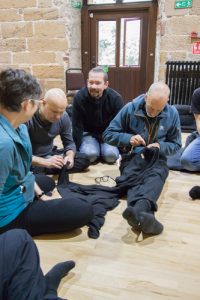
Dear Fellow Practitioners,
I do hope you find time for celebration and a rest over the coming holiday and that the new year is a good one for you. StoneWater continues to grow and 2018 has been a busy year with a full calendar. 2019 promises to be the same so do please keep an eye on the web site www.stonewaterzen.org. for the dates of various retreats and ceremonies. The sesshin at Crosby in April is already fully booked but if you are interested do add your name to the waiting list since nearer the date we often have some cancellations.
Below I have copied a piece I wrote a few years ago on practice and daily life and coupled it with an edited extract from a commentary on Dogen’s Genjokoan, something he wrote for a lay practitioner, perhaps somebody like us but living in Japan a thousand years ago who maybe asked the same question about bringing practice into daily life. Apologies, together they are quite a long read. This may be good for after the Queen’s Speech and Xmas dinner!
Practice and Daily Life
“For most of us, work, family, relationships, friends and holidays are usually of primary importance in our lives with ‘spiritual practice’ low down on our list of priorities. I say this not as a judgement but as a pragmatic observation. However, I am interested in why this is the case. And then even if we do wish to engage with ‘Zen practice’ and bring it into our everyday lives, the question arises about how do we do this? For me these two questions and their answers may be linked. For example a common experience is that although we may be trying to integrate practice into our lives we feel we are not succeeding. Why is that? One source of this sense of failure that I see is that often our hope or belief is that ‘real’ practice will make our lives trouble free. It will be the complete solution to our doubts, fears and worries. However, practice in this sense is not a universal panacea nor is it designed to be so.
If we have the expectation that it is and then discover it is not we may either lose faith in the point of practice or we think we have failed because we do not do enough (or sit hard enough, or train with the right teacher or right tradition etc.). Neither approach is conducive to long term practice.
For me another perspective to take on the dilemma is to flip the usual questions of how do I prioritise practice and how do I bring practice into my everyday life. Instead ask the one question: ‘how do I bring my everyday life into my practice?’ From this perspective I now embrace the view that the life I am leading now, with all its attendant problems and joys, is in fact my real and authentic life, the life I have been looking for. Work, relationships etc. are my practice. Dedicated spiritual practice now becomes not something to ‘improve’ life but a way of appreciating its moment to moment sacredness. Zen then becomes a tool to help in fully engaging with our lives and developing the confidence to commit fully to all that life brings. Along the way we can also cultivate goodwill towards ourselves and others and develop a more panoramic, spacious view of life. All of which contribute to remaining sane and to having faith in the sacredness of each moment. Practice now becomes intrinsic to my daily life and, just as importantly, life becomes intrinsic to my daily practice.”
Below is an extract I have edited from “Zen Questions: Zazen, Dogen and Creative Inquiry” by Taigen Dan Leighton. I hope you enjoy it.
“The meaning of Genjokoan is to fully or completely manifest, or more loosely to express or share, what is essential in the situation in front of us, and to do this within ourselves, together in sangha and for our world as a whole. “To genjokoan,” as a verb, is to fully express our hearts, to be present in all aspects of our life, to bring our life to life, to allow ourselves to express the world, to allow the world to express ourselves. We need to “genjokoan” both delusion and enlightenment.
Each of us individually and all of us together, beings seen and unseen, beings human and otherwise, are all completely a subset of the myriad things, of reality arising right now. Our practice is to actually wake up to our delusions. We sit upright and present, settling down into our inner dignity, and when we do that we see delusions everywhere. We see our habits of attachment and of grasping. We see our conditioned patterns of reaction. We see our fears and sadness and all the aspects of our life in which we feel damaged or hurt. We see our own patterns of creating more difficulty for ourselves and for others. This all takes a while. To see delusion and enlightenment is easy. That can happen any time. But then to actually bring this fully into our life is the endless practice of studying ourselves, just being there as ourselves. Buddhas are greatly enlightened and awakened to their delusions. This is our practice.”
Very best wishes for Xmas and 2019!
Kind regards,
Keizan Sensei
